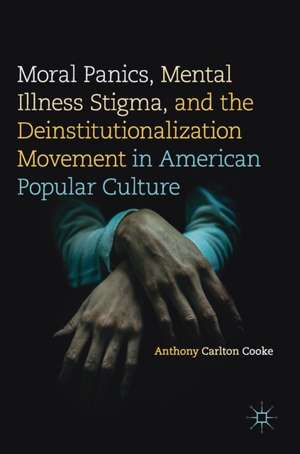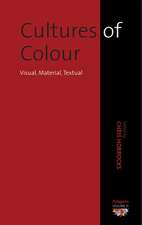Moral Panics, Mental Illness Stigma, and the Deinstitutionalization Movement in American Popular Culture
Autor Anthony Carlton Cookeen Limba Engleză Hardback – 24 oct 2017
| Toate formatele și edițiile | Preț | Express |
|---|---|---|
| Paperback (1) | 381.98 lei 6-8 săpt. | |
| Springer International Publishing – 23 aug 2018 | 381.98 lei 6-8 săpt. | |
| Hardback (1) | 386.99 lei 6-8 săpt. | |
| Springer International Publishing – 24 oct 2017 | 386.99 lei 6-8 săpt. |
Preț: 386.99 lei
Nou
Puncte Express: 580
Preț estimativ în valută:
74.05€ • 77.52$ • 61.27£
74.05€ • 77.52$ • 61.27£
Carte tipărită la comandă
Livrare economică 05-19 aprilie
Preluare comenzi: 021 569.72.76
Specificații
ISBN-13: 9783319479781
ISBN-10: 3319479784
Pagini: 191
Ilustrații: VII, 191 p.
Dimensiuni: 148 x 210 mm
Greutate: 0.39 kg
Ediția:1st ed. 2017
Editura: Springer International Publishing
Colecția Palgrave Macmillan
Locul publicării:Cham, Switzerland
ISBN-10: 3319479784
Pagini: 191
Ilustrații: VII, 191 p.
Dimensiuni: 148 x 210 mm
Greutate: 0.39 kg
Ediția:1st ed. 2017
Editura: Springer International Publishing
Colecția Palgrave Macmillan
Locul publicării:Cham, Switzerland
Cuprins
1. Introduction: Popular Panics.- 2. From the “Feebleminded Offender” to the “Sexual Psychopath”.- 3. Deinstitutionalization and the Rise of the “Slasher”.- 4. The Forensic Detective as Panic Figure.- 5. The Panic Figure and the Psychopath: A Psychical Correspondence.- Conclusion.
Notă biografică
Anthony Carlton Cooke is Visiting Assistant Professor in the Department of Writing and Linguistics at Georgia Southern University, USA. His work has been published in journals such as Journal of Black Studies and Psychoanalysis, Culture and Society. In addition to his academic work, Anthony has published poetry and fiction in the African American Review and the Arkansas Review.
Caracteristici
Puts forth a new theory of the "panic figure" in American fiction, drama, television Uses cultural and critical analysis to illustrate the link between mental healthcare discourse and popular representation Offers perspectives on representation of mental illness stigma from the turn of the twentieth century to the end of the twentieth century Includes supplementary material: sn.pub/extras









